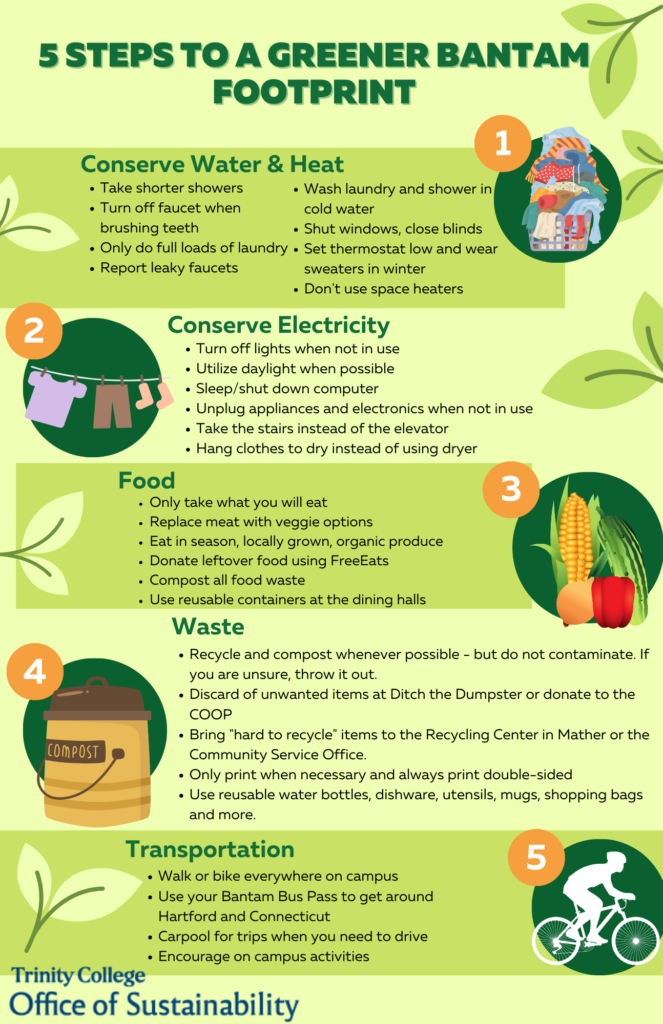Back to Sustainability at Trinity
Student Guide
Take simple actions to lead a more sustainable lifestyle and help us reach our goals.

Programs and Resources
How to Live More Sustainably at Trinity
- Turn off lights and power off electronics when not in use, especially during breaks.
- Change your computer settings to sleep after 15 minutes or less
- Unplug appliances when not in use, including your phone and laptop chargers. Use a power strip so you can turn all of your electronics easily at night or before breaks.
- Purchase only LED light bulbs as they are more energy efficient and contain no mercury. You can recycle compact fluorescent light bulbs (CFLs) at our recycling center in Mather Hall.
- Don’t open your windows when the heat or A/C is on.
- Take shorter showers to help conserve water and save the energy it takes to heat the water.
- Turn off the faucet when brushing your teeth.
- Run your washing machine in the cold “bright colors” setting to save energy. Using cold water also makes your fabrics last longer, it takes a lot of water and energy to produce a pair of jeans.
- Report any leaks, water fountains with low pressure, and other maintenance requests here.
- Grab your bantam bus pass and hop on Hartford’s CT Transit bus system.
- Before you bring a personal vehicle to campus consider bringing a bike and signing up for a Zipcar membership. Fewer personal cars on campus reduces traffic, congestion and CO2 emissions.
- Wheeli is also a carpooling app available for college students.
Help us reduce the amount of waste that goes into the landfill. Here are a couple of tips:
- Bring your own mug to Peter B’s or the Underground and receive a discount.
- Carry your own refillable water bottle at all times
- Order your drinks in a ceramic mug if you don’t need it ‘to go’.
- Use reusable dishware and silverware in your room and bring them for events.
- Only take food that you will eat. If you end up with food waste, make sure to compost it.
- Crescent St. residents can compost at home. Contact Hayley Berliner ([email protected]) if you’d like to start composting in your townhouse.
-
- Before buying books or school supplies, check the Book Swap and Office Supply Swap tables in the basement of Mather.
- Before buying anything for your room, check The COOP for a cheaper, used option.
- You can also donate items that could be reused to stock The Coop or be given to a local organization. Please contact [email protected] if you wish to donate.
- Trinity College participates in single stream recycling, this means all your recyclables go in the same bin. All our dining facilities participate in a compost program, students can compost their food scraps in Mather Hall. For more information on recycling and composting click here.
- Some items are harder to recycle, such as light bulbs, batteries, small electronics, disposable masks and plastics bags. Bring those items to the recycling center in Mather Hall. We also recycle ink cartridges, bring them to the Office of Community Service and Civic engagement in the basement of Mather.
- See what other students are up to in our Student Highlights section.
- Interested in being part of the Student Government Association (SGA) Sustainability Committee, e-mail the President Ava Caudle.
- Trinity’s Office of Community Service and Civic Engagement provides students with opportunities to get involved with a wide variety of different organizations. Click here to check out what student clubs like Green Campus or organizations like ConnPIRG are all about.
- Interested in a career in the world of sustainability, The Career and Life Design Center supports you through every step of the process. Schedule One-on-One coaching sessions, apply for internships and jobs or join a career community based on your interests.
- Join Climate Change Plus a group organized under the auspices of Trinity’s Program of Public Values. The program is now in its second year, co-sponsored by The Trinity Institute for Interdisciplinary Studies (TIIS) and Political Science department, involves regular Tuesday common hour lunches at 71 Vernon Street, during which a small group of undergraduates will discuss a range of climate change and other public issues with a few faculty and staff members and invited guests. To participate, students commit to attending 1-2 lunches per month plus occasional additional events featuring guest speakers. Anyone is invited to suggest a guest or subject for discussion. Please e-mail Christine McCarthy McMorris to express your interest in joining and receive an invitation.
- Attend lectures and other events on sustainability and climate change.
- Follow the MyPlate on campus initiative created by The USDA and brought to Trinity by our dining services provider.
- Interested in growing your own vegetables or participating in urban gardening then check out Trinity College’s Community Garden which is managed by Trinfo Cafe, a community space connecting Hartford to Trinity College. The community garden is a space where local residents can connect with the rest of the Trinity community and build relationships based on mutual interests, like gardening, composting, cooking and beekeeping.
- Trinity’s recreation department offer a variety of fitness classes on and off-campus, including but not limited to rock-climbing, Zumba and yoga.
- Sustainability is about finding a balance in all aspects, not only environmentally. Please visit our Health and Wellness page to find more information on our Counseling and Wellness Center, Spiritual and Religious Life, fitness, and the Health Center.
GET IN TOUCH
Assistant Director of Sustainability
Hayley Berliner
300 Summit Street
Hartford, CT 06106
Hartford, CT 06106
